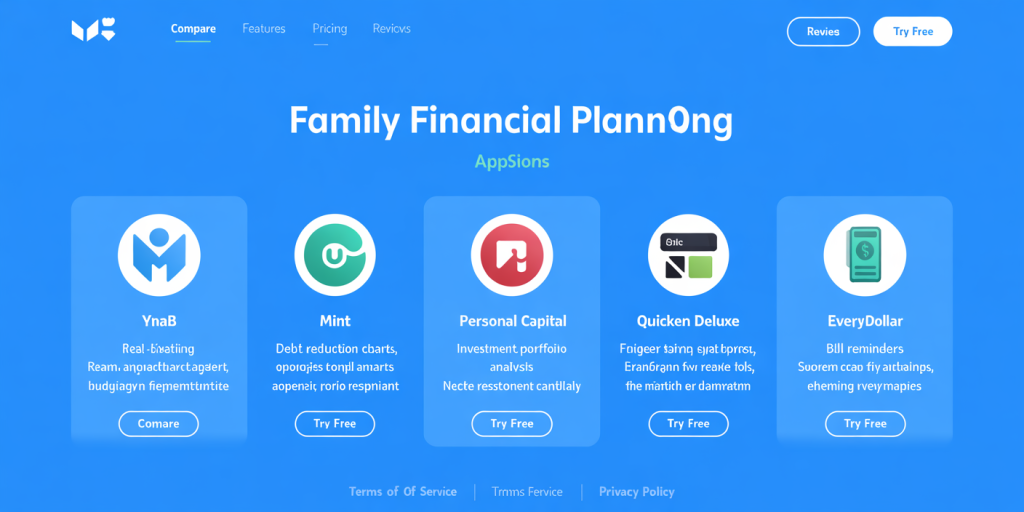Best Family Financial Planning Software Recommendations
Managing family finances is often a complex and time-consuming task that requires balancing incomes, expenses, savings, and investment goals. With the increasing availability of digital solutions, family financial planning software has become a valuable tool for households aiming to achieve financial stability and growth. These software options help families track spending, budget effectively, set saving goals, and prepare for future expenses such as education, vacations, or retirement.

According to a 2023 survey by the National Endowment for Financial Education, nearly 60% of American families who use financial planning software report feeling more confident about their financial decisions. These tools are particularly beneficial in helping families visualize their financial health, providing real-time updates and tailored recommendations. Understanding which software suits your family’s unique needs can make a significant difference in your financial journey. This article explores the best family financial planning software available today, highlighting their features, pros, and cons to help your household make informed choices.
—
Understanding the Importance of Family Financial Planning Software
Family financial planning software serves as a centralized hub for monitoring all financial activities across a household. Unlike individual finance apps, these platforms are designed to synchronize income streams, expenses, debts, investments, and savings across multiple family members. This comprehensive approach facilitates cooperative decision-making, enabling families to align their financial goals.
For example, consider the Smith family from Ohio, who struggled with tracking both parents’ incomes, two children’s expenses, and a mortgage payment. Using family financial software with multi-user capabilities, they consolidated their budget and set clear savings targets for their kids’ college funds and upcoming home renovations. The software provided alerts on overspending and suggested reallocations for optimal debt repayment, which helped the Smiths reduce their monthly expenses by 15% within six months.
With rising concerns about financial literacy and debt management among families, tools that simplify budgeting and forecasting become indispensable. Statistical data from Experian’s 2023 report shows that families who actively use budgeting apps save on average 20% more annually compared to those who rely solely on manual tracking or no planning at all.
—
Top Recommendations for Family Financial Planning Software
Choosing the best software depends on family size, financial complexity, and specific objectives such as debt reduction, investment tracking, or education savings. Below is a comparative table of the five leading family financial planning platforms identified based on features, ease of use, pricing, and customer feedback.
| Software | Best For | Key Features | Pricing | User Rating (out of 5) |
|---|---|---|---|---|
| YNAB (You Need a Budget) | Budgeting and Expense Tracking | Real-time budgeting, goal setting, education resources | $14.99/month or $99/year | 4.7 |
| Mint | Comprehensive Financial Overview | Automated transaction tracking, bill reminders, credit score monitoring | Free | 4.5 |
| Personal Capital | Investment and Retirement Planning | Portfolio tracking, net worth analysis, retirement calculators | Free, premium advisory services available | 4.6 |
| Quicken Deluxe | Detailed Expense Management | Bill pay, tax planning, investment tracking | $49.99/year | 4.3 |
| EveryDollar | Debt Reduction and Budgeting | Customized monthly budgets, debt snowball tracking | Free version, Plus at $129.99/year | 4.4 |
Each of these tools offers unique strengths catering to various priorities a family might hold. Deciding which program suits your financial planning needs requires analyzing your household’s financial structure and long-term goals.

—
YNAB: Mastering Budgeting for Family Goals
You Need a Budget (YNAB) has earned its reputation as a powerful budgeting tool favored by families looking to actively manage their day-to-day finances and save for milestones. What sets YNAB apart is its “zero-based budgeting” philosophy which encourages users to assign every dollar a job, promoting intentional spending.
Take the case of the Hernandez family from Texas. Before adopting YNAB, they frequently found their monthly expenses exceeded income due to untracked purchases. By utilizing YNAB’s real-time budget adjustments and category rollover features, they curbed unnecessary spending habits and established a college fund for their twins. Within eight months, they cleared $5,000 of credit card debt.
YNAB offers strong educational material, including workshops and tutorials, which supports financial literacy. According to a 2023 FinanceBuzz review, 78% of YNAB users reported feeling more in control of their spending habits after three months of use. The subscription pricing might be a barrier for some, but its benefits in fostering disciplined budgeting often outweigh the cost.
—
Mint: All-In-One Financial Overview for Families
Mint remains one of the most popular free personal finance apps and is especially effective for families looking for an aggregated view of all their finances. Its ability to link bank accounts, credit cards, loans, and investments provides a holistic snapshot, essential for total household money management.
A practical illustration comes from the Lee family in California who used Mint to consolidate all financial data on one platform. By enabling automatic bill reminders and credit score tracking, Mint helped prevent late fees and identify credit building opportunities. Its cash flow visualization tools helped them prioritize debt repayments and increase emergency savings by 12% within a year.
On the downside, as a free app, Mint includes advertisements and some upselling to premium services, which might detract from user experience. However, expert analysts, like those at NerdWallet, consistently rank Mint as a reliable tool for families that want comprehensive financial tracking without cost.
—
Personal Capital: Ideal for Long-Term Wealth and Retirement Planning
For families focused on investment growth and future security, Personal Capital offers advanced portfolio analysis and retirement planning tools. It syncs multiple financial accounts, calculates net worth, and provides personalized investment advice, making it a favorite among those with diverse investment portfolios.
The Johnson family utilized Personal Capital’s retirement planner to forecast their needs, adjusting contributions to their 401(k) and college savings fund accordingly. This proactive planning enabled them to balance present spending with future responsibilities effectively.
Data from a 2023 WealthManagement report indicates that users of Personal Capital’s free tool typically see a 15-25% improvement in portfolio diversification and risk assessment. While the platform is free, professional wealth management services are available at a premium, which families with substantial assets may find valuable.
—
Quicken Deluxe: Comprehensive Expense and Tax Management
Quicken Deluxe appeals to families who desire a detailed view and control of their finances, integrating aspects such as bill pay, detailed reports, and tax planning. Its desktop-based platform with cloud sync offers robust features for tracking every financial angle, including investments and property valuations.
The O’Connor family from New York leveraged Quicken Deluxe to navigate a complex financial scenario involving rental properties, multiple income streams, and tax implications. The software’s extensive reporting tools simplified preparing for tax season and facilitated better budgeting throughout the year.
Though Quicken requires an annual purchase and has a steeper learning curve, the depth of its features makes it a strong contender for families with complicated financial situations. The software’s persistence in offering updates and security improvements solidifies its longevity in personal finance management.
—
EveryDollar: The Go-To for Debt Reduction Strategies
EveryDollar focuses on simplifying monthly budgeting and aggressively tackling debt using the popular “debt snowball” method popularized by financial guru Dave Ramsey. It allows families to create custom budgets, track spending, and monitor debt payoff progress in an intuitive user interface.
The Rodriguez family, struggling with multiple credit cards and a car loan, used EveryDollar Plus’s automated transaction syncing to maintain accurate records. By consistently applying the debt snowball strategy, they eliminated $10,000 of consumer debt in under two years, freeing up capital to invest in family vacations and home improvements.
Its free version attracts casual users, while the Plus version offers enhanced features such as bank syncing and detailed reports. According to Ramsey Solutions, families practicing EveryDollar’s budgeting methodology increased their savings rate by an average of 18% within the first year.
—
Future Trends in Family Financial Planning Software
The landscape of family financial planning software is evolving rapidly, driven by technological advances and changing user needs. Artificial intelligence (AI) and machine learning are increasingly integrated to provide predictive analytics, personalized financial coaching, and automated investment rebalancing, thereby enhancing decision-making efficiency.
For instance, emerging platforms incorporate AI-driven alerts that not only track overspending but suggest optimal bill payment dates to maximize cash flow. Moreover, integration with smart home devices and voice assistants like Alexa and Google Home enable family members to interact with financial data hands-free, increasing accessibility and engagement.

Cybersecurity remains a paramount concern. Future family financial apps are focusing heavily on advanced encryption and biometric authentication to protect sensitive data from growing cyber threats. Regulatory frameworks around data privacy, such as GDPR and CCPA, also influence software development by mandating greater transparency and user control over personal financial information.
Additionally, there is a rising trend in customizable family finance apps that support intergenerational financial education, allowing parents to teach children about money management from a young age through gamification and interactive challenges. This promotes financial literacy and responsibility at the household level.
Predictive models forecasting financial trends, like inflation rates or changes in tax law, are becoming standard features in premium packages, enabling families to proactively adjust strategies. Combined with cross-platform synchronization—from mobile apps to desktop software—future family financial planning tools promise seamless, proactive, and secure management of household finances.
—
Family financial planning software has become an essential resource for managing today’s increasingly complex finances. Whether prioritizing budgeting, investment growth, debt reduction, or tax management, the right tool can empower families to achieve financial goals while fostering communication and accountability. As advancements continue, these platforms will offer even more sophisticated and user-friendly interfaces, making comprehensive family finance management accessible to all households.
